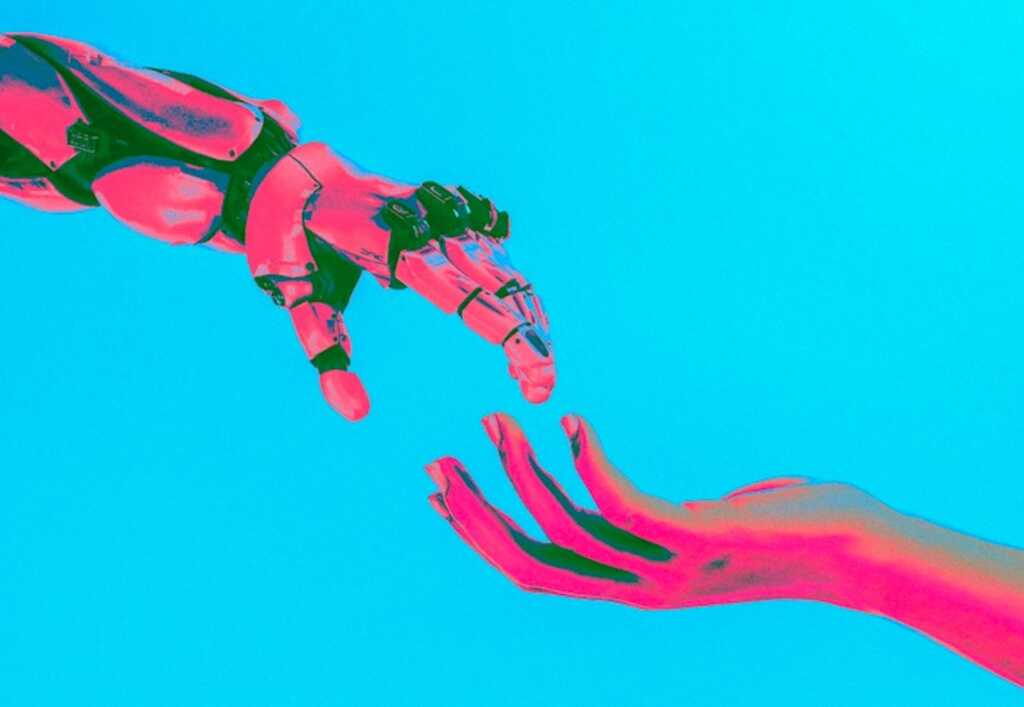Is artificial intelligence (AI) ethical? That’s the question secular and Christian leaders alike are contending with as technology quickly evolves.
Listen to the latest episode of “Quick Start” 👇
Andre Echevarria, leader of U.S. digital strategies at Cru, a large Christian ministry formerly known as Campus Crusade for Christ, is among those contending with how to use AI.
Rather than shun the burgeoning tech, he believes it’s a tool that can be used to spread the Gospel. Echevarria offered up an intriguing response when asked if AI is moral.
“Rather than debating that part, I would say, ‘Can we redeem it for the glory of God?'” he said. “And that’s actually what we’re doing here. We’re using a lot of that technology to be able to actually help people discover a relationship with Jesus, go deeper in their relationship with Jesus, or maybe even share their current relationship with Jesus with their neighbors.”
He said the ethics of the matter really depends on a key factor: how people choose to use AI. Watch Echevarria explain:
Already, Echevarria is seeing the benefits of using social media and technologies like AI. He shared a recent text he received from an individual who always felt like an outcast. The text read as follows:
“I never grew up with a true role model in my life. I was never raised religious. My story starts after 2020. I tried to make the best of it through COVID, but I felt like something [was] missing. Plus, on top of high school starting, I felt very isolated. However, at the end of my sophomore year, I decided to give Jesus a try. Christians were coming up on my ‘For You’ page on social media, so I decided to research more about it. Eventually, I got listening to the Bible every day and eager to know more about God.”
Reflecting on this text message, Echevarria said the story provides a wonderful illustration of how Cru is using AI and other tools in virtual and online spaces to help bring people closer to God.
“So let’s say that our friend here has certain characteristics, like maybe they like certain brands and certain types of posts,” he explained. “So, we’re able to use AI to find more people like her and then be able to put our offers and messages of hope in front of them. So we’re using the AI built into some of our advertising platforms to be able to find more people that we can actually share the gospel with.”
Echevarria said they’re also using the technology to help equip people and let them know, based on certain “aptitudes,” about available resources to help them share their faith with neighbors.
“And whether that resource is in a certain language or certain context … we’re able to actually provide that for you,” he said. “So, we’re using AI in a lot of different spaces like this to … help us be able to contextualize a lot of this.”
Echevarria is fully aware of the critiques and worries surrounding AI, but warned of what could happen if Christians decide to fully disengage or ignore it.
“We just lose an opportunity,” he said. “We should take every opportunity to share … the eternal hope we have. And we just miss an opportunity.”
He tries to encourage people to see AI as an “advanced intern” — a useful tool that can help make tasks easier, not totally overtake people’s processes.
“In turn, you obviously wouldn’t let [an intern] run your radio show daily, right?” he said. “You’d have them maybe do some research and maybe bring up some topics, ideas, and some things that you can then fine-tune for the effort and the outcome that you want for the show.”
Echevarria said this is how Cru is using AI — to help analyze documents, explore analytics, and even translate.
“We’ve seen really great fruit from that,” he said. “We’re seeing a lot of people engage with the material.”
With all of this in mind, Echevarria stressed the importance of putting up guardrails to ensure AI is under control and not taking over each process. This is something Cru is quite intentional about, with Echevarria noting that there’s never a moment when fully automated virtual content is used.
“AI doesn’t have a story,” he said. “We have a story, and that story God continues to write.”
Cru’s use of AI, he said, has yielded examples of people “taking multiple steps in their spiritual journey,” offering opportunities for staff to engage and help bring these people further in understanding the Gospel.
As for future uses, Echevarria said he believes customization will continue to be tweaked and used to reach people in different cultures and contexts.
But one major area where AI could become even more indispensable is in the translation realm.
“Whether it’s translating books or resources, being able to have a resource and translate it into 60, 70, 80 languages on demand in minutes rather than months and years is a huge advantage for how we’re accelerating a ministry,” he said.
Cru isn’t currently using AI to translate the Bible, but is employing the technology to translate Gospel presentations. He said he has personally been able to use the tool for such conversations, calling it an “accelerator.”
For smaller ministry teams, Echevarria also pointed to copyediting, graphic design, and other tasks, noting AI can help generate much-needed content for teams who don’t have the resources to create in these areas.
***As the number of voices facing big-tech censorship continues to grow, please sign up for Faithwire’s daily newsletter and download the CBN News app, developed by our parent company, to stay up-to-date with the latest news from a distinctly Christian perspective.***



